If you dream of transforming your outdoor space into a functional and beautiful retreat, understanding the timing, planning, and local requirements is essential for a successful landscape renovation. At Swick’s Landscaping, we frequently hear questions like, “When is the best time to start?” and “How long will it take?” This guide answers these questions and highlights why timely renovations are crucial
Why start a Landscape Renovation Project?
Updating your landscape is more than just an aesthetic upgrade – it’s a crucial investment in your property’s functionality and value. Neglecting timely renovations can result in missed opportunities to enhance usability and prevent long-term issues such as erosion, poor drainage, and deteriorating hardscapes. By addressing these concerns promptly, you can avoid compounding problems that are costlier and more time-consuming to resolve
Here’s why it’s worth acting sooner rather than later:
- Improved Curb Appeal: A well-maintained landscape boosts your property value.
- Enhanced Usability: Thoughtful design creates spaces for relaxation, entertainment, and functionality.
- Preventative Maintenance: Tackling drainage or erosion problems early prevents costly structural repairs.
- Sustainability: Modern landscaping methods can reduce water use and improve energy efficiency.
When to Start a Landscape Renovation?
Understanding the importance of a landscape renovation is just the beginning. Timing your project effectively ensures that your goals are met efficiently while avoiding unnecessary delays or complications. Let’s explore how Vancouver’s unique climate and seasonal factors play a role in planning your renovation.
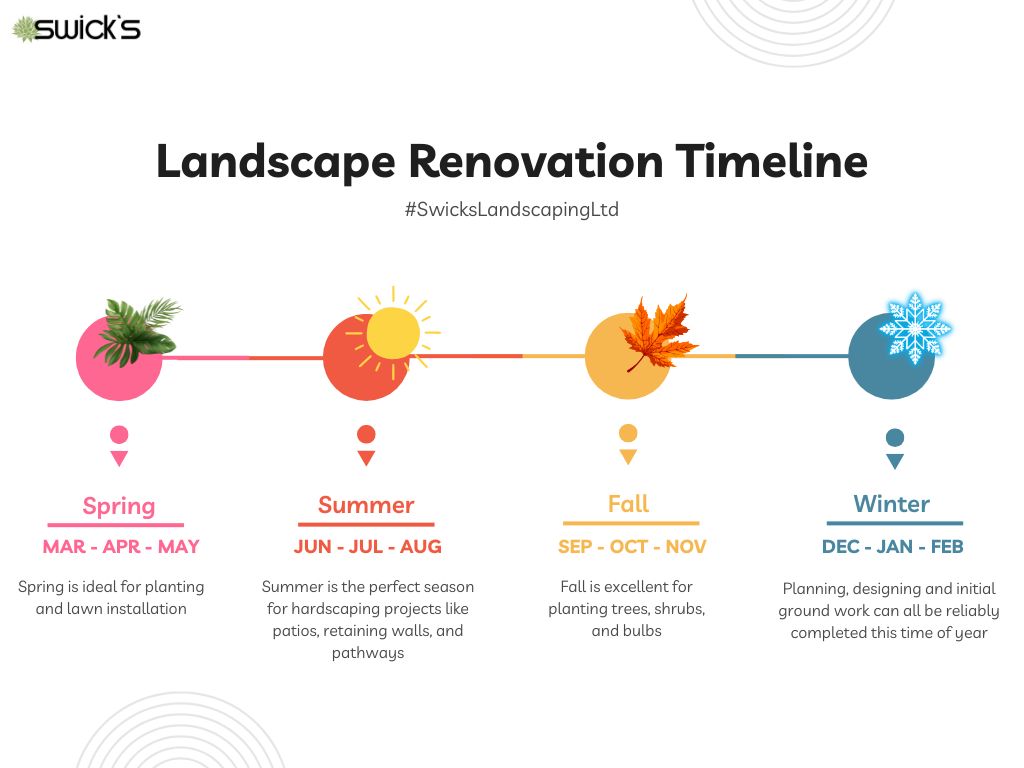
- Spring (March to May):
Spring is ideal for planting and lawn installation. Vancouver’s cool, wet weather encourages vibrant growth and helps plants establish quickly. However, this is also a busy season for landscapers, so book your project early to secure your preferred timeline. - Summer (June to August):
With dry weather, summer is the perfect season for hardscaping projects like patios, retaining walls, and pathways. However, planting during the heat requires extra care, particularly with proper irrigation systems. A professionally installed automatic irrigation system is highly recommended for Vancouver’s dry summers. - Fall (September to November):
Fall is excellent for planting trees, shrubs, and bulbs. The consistent rain helps plants develop strong root systems before winter. Fall is also a great time to assess your landscape for drainage issues and plan renovations to avoid the busy spring season. - Winter (December to February):
Winter is generally. A great time to start a larger scale project. Planning, designing and initial groundwork can all be reliably completed this time of year. While planting may be limited, mild Vancouver winters often allow for off-season hardscaping projects to continue.
Start with the End in Mind
To ensure a successful landscape renovation, thoughtful planning is essential. By envisioning your ideal outcome and setting clear goals, you can work backward to establish a realistic timeline and strategy. This approach not only aligns your project with seasonal factors but also helps you avoid unnecessary delays and complications. Here’s how to plan effectively:
- Set Your Timeline Early: Large-scale renovations can take several months, especially if permits, custom materials, or BC Hydro upgrades are required.
- Account for Weather: Vancouver’s rainy winters and springs can occasionally delay work, so it’s wise to build in some flexibility.
- Factor in Seasonal Demand: Spring and summer are peak landscaping seasons, so booking early ensures your project is prioritized.
- Allow for Plant Establishment: If planting is part of your plan, consider that plants often need a season or two to fully establish and look their best.
How Long Will It Take?
The duration of a landscape renovation depends on the project’s complexity and scale. Vancouver’s weather, soil conditions, and regulatory requirements can also influence timelines.
- Small Projects (1-3 Weeks):
Tasks like planting garden beds, adding pathways, or installing lawns typically take 1 to 3 weeks. In Vancouver, these projects often require attention to drainage and soil quality to ensure durability. - Medium Projects (4-8 Weeks):
Projects involving multiple elements, such as patios, irrigation systems, and softscaping, may take 4 to 8 weeks. Vancouver’s soils often need amendment to support healthy plant growth and prevent waterlogging. - Large Projects (3-12 Months):
Full property redesigns with features like outdoor kitchens, water features, and expansive planting schemes can take several months. Municipal permits, BC Hydro upgrades, and weather conditions may extend timelines, so plan accordingly.
Special Considerations for Vancouver Area
BC Hydro Power Upgrades
If your renovation includes requirements for electricity with features such as; hot tubs/ pools, outdoor kitchens, lighting, saunas etc.. you may need to upgrade your electrical service. Here’s what to keep in mind:
- Assessment: Consult with an electrician early to evaluate whether your existing system can handle the new load.
- Permits: BC Hydro often requires permits and inspections for electrical upgrades, these can take time so plan ahead.
- Sustainability: Consider energy-efficient systems to reduce long-term costs.
Pools and Water Features
Pools are a stunning addition to any landscape, but they require careful planning:
- Filtration Systems: Ensure your system complies with local water usage and drainage regulations.
- Permits: BC Hydro often requires permits and power upgrades to support a pool. Inspections are likely required for electrical upgrades.
- Environmental Compliance: Features like pools may need stormwater management measures to align with Vancouver’s environmental guidelines.
Permit Requirements for Permeability
Vancouver emphasizes permeability in landscape design to manage stormwater and prevent flooding. Adding non-permeable surfaces like concrete patios or driveways requires permits. Here’s how to meet the requirements:
- Permeable Materials: Opt for gravel, or permeable pavers/jointing materials.
- Stormwater Management: Incorporate rain gardens, bioswales, or French drains into your design.
- Permits: Work with a professional familiar with Vancouver’s zoning and environmental bylaws to streamline the permit process.
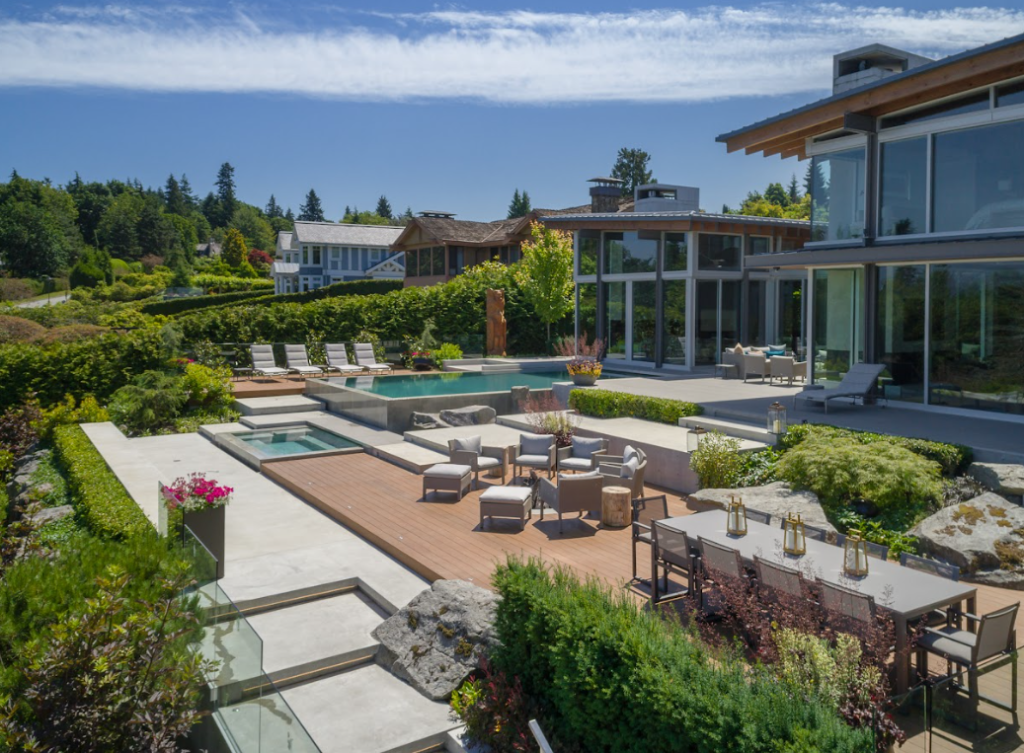
How to Get Started
- Plan Ahead: Start discussions with a landscaping professional 3 to 6 months before your ideal start date to allow time for design, permits, and scheduling.
- Set Goals: Define how you want to use your outdoor space. Whether it’s a low-maintenance garden, an entertaining area, or a showcase for curb appeal, your goals will shape the design.
- Budget Realistically: Share your budget during the initial consultation to align your project’s scope with your financial goals. Avoid designing something extravagant only to scale it back later.
- Trust the Process: Landscape renovations are an investment. Partnering with a trusted company ensures the work is done with high-quality materials and expertise, creating a landscape that lasts a lifetime.
Why Choose Swick’s Landscaping?
By now, you understand the importance of timely landscape renovations, how seasonal factors influence your timeline, and the steps involved in planning a successful project. At Swick’s Landscaping, we take the guesswork out of the process by combining our extensive local expertise with a commitment to excellence. From addressing Vancouver’s unique climate challenges to navigating permit requirements, we specialize in creating sustainable, stunning landscapes tailored to your needs.
With over 20 years of experience in Vancouver’s unique climate, Swick’s Landscaping specializes in creating sustainable and lasting outdoor spaces.
For understanding more about what is the Best Ground Cover Options for Your PNW Garden or to get professional help!
Any questions? contact us today.
info@swicks.net | 604-315-8592
GET IN TOUCH

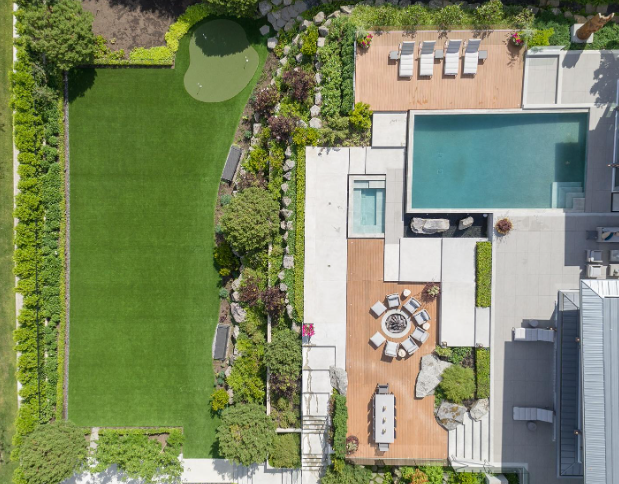
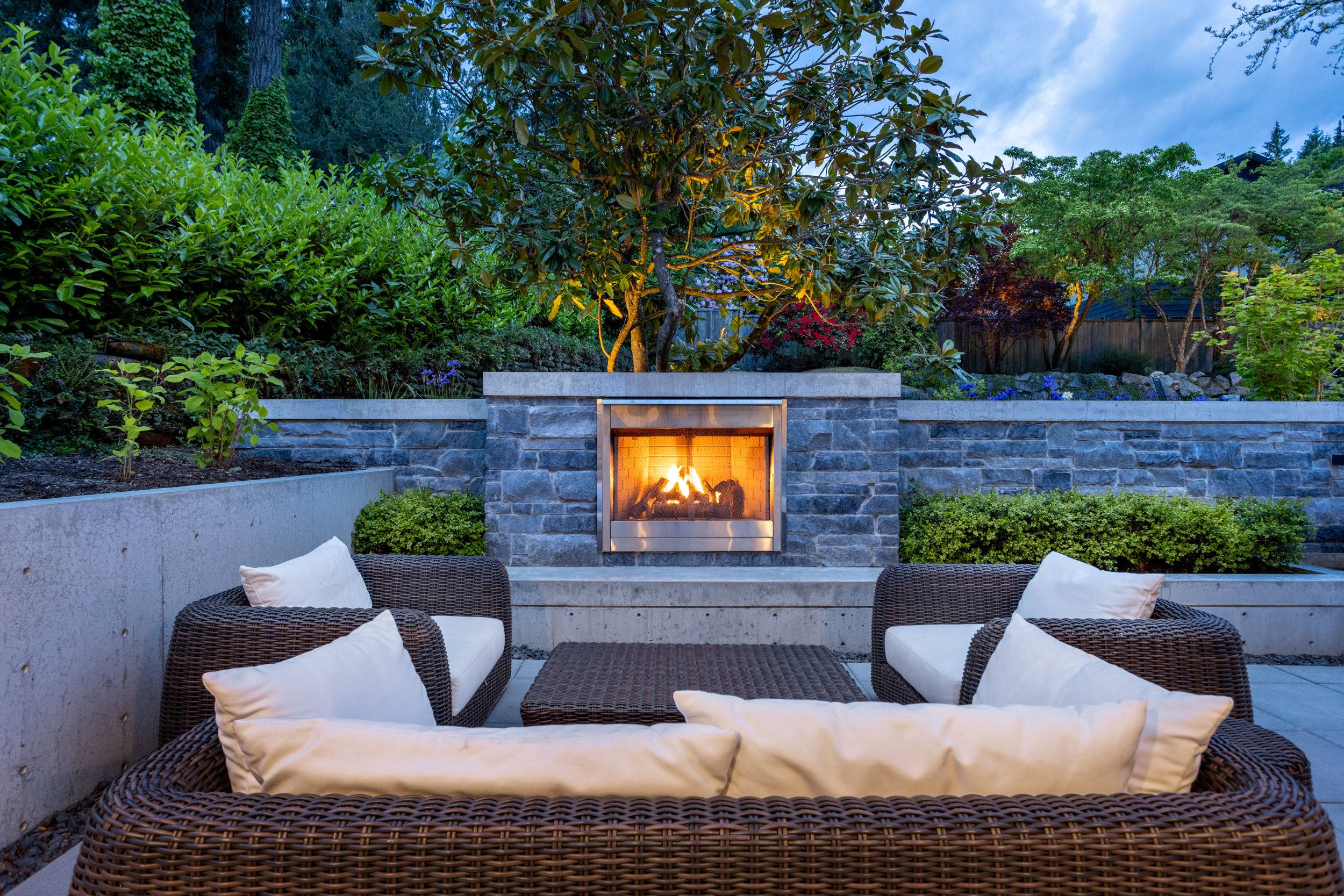
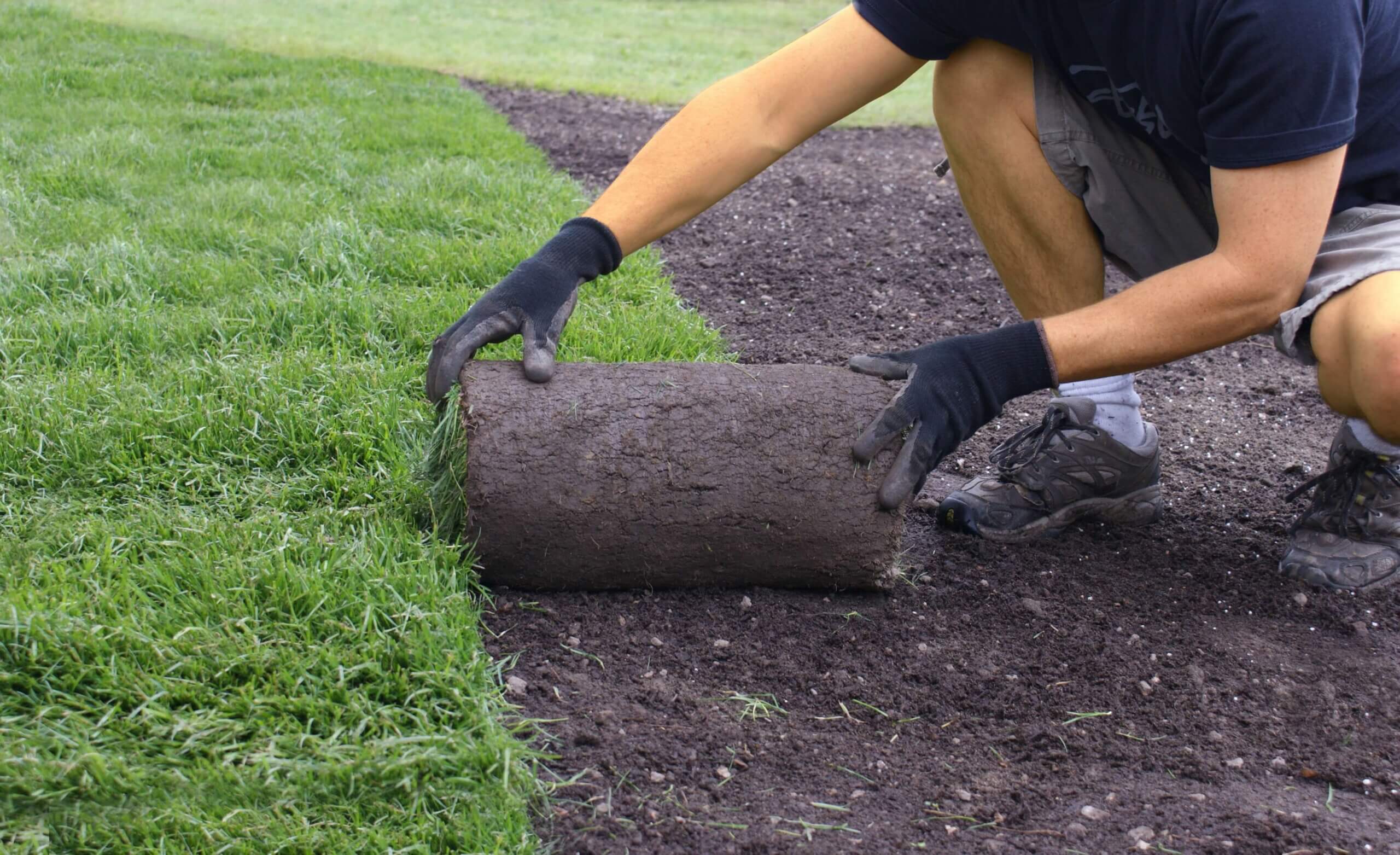
 Contact Us
Contact Us